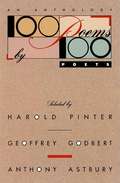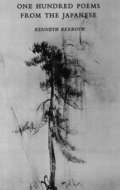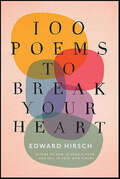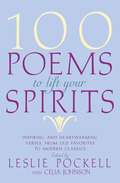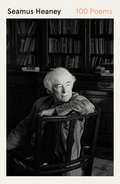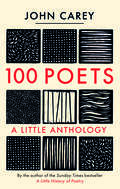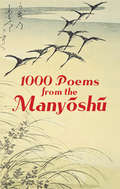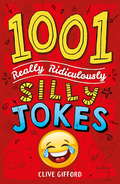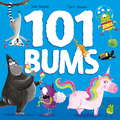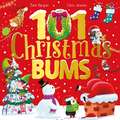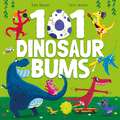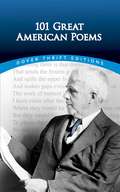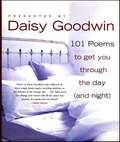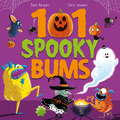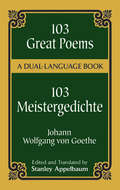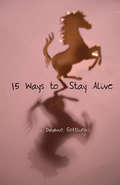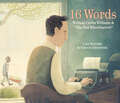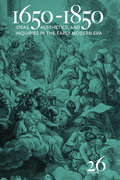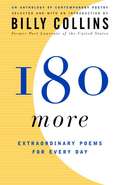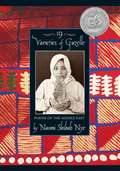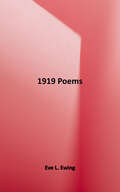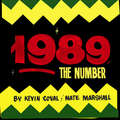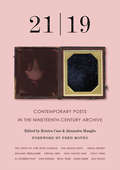- Table View
- List View
100 Poems
by Helen WilcoxGeorge Herbert (1593-1633) is widely regarded as the greatest devotional poet in the English language. His profound influence can be seen in the lasting popularity of his verse. This selection of one hundred lyric poems by Herbert is designed for readers to enjoy the beauty, spirituality, accessibility and humanity of his best verse. Each poem uses the authoritative text from the acclaimed Cambridge edition of Herbert's poems, presenting them in their original spelling in a clear and elegant format. The selection includes such well-loved lyric verses as 'Love bade me welcome', 'Let all the world in ev'ry corner sing', 'I struck the board and cry'd, No more' and 'Sweet day, so cool, so calm, so bright'. A preface by Helen Wilcox, editor of the Cambridge edition, celebrates the key features of Herbert's poetry for a new generation of readers.
100 Poems
by Rudyard Kipling Thomas PinneyRudyard Kipling (1865-1936), winner of the 1907 Nobel Prize for Literature and author of one of the most popular poems in the English language, 'If-', has long captured the interest of poetry lovers. Here, Thomas Pinney brings together a selection of well-established favourites and the best of the previously uncollected and unpublished poems from The Cambridge Edition of the Poems of Rudyard Kipling (2013). The poems, whether exploring the colonial experience, exposing the injustice of war, or appreciating the beauties of nature, resonate with Kipling's keen observations of his world and strong sense of poetic rhythm. Discovered by Pinney in an array of unlikely hiding places, the uncollected and unpublished poems show the diversity and development of Kipling's talent over his lifetime, and, when combined with long-held favourites, offer readers a unique opportunity to experience Kipling's mastery of poetry in a new way.
100 Poems By 100 Poets: An Anthology
by Harold Pinter Geoffrey Godbert Anthony AstburyThis book took final shape on a train journey to Cornwall in January this year, when Anthony Astbury, Geoffrey Godbert and myself went to visit Nessie Graham, following the death of her husband, W. S. Graham. By the time we had taken the return journey to London, 100 Poems by 100 Poets was well on its way. It was a great twelve hours.
100 Poems from the Japanese
by Kenneth RexrothIt is remarkable that any Westerner--even so fine a poet as Kenneth Rexroth--could have captured in translation so much of the subtle essence of classic Japanese poetry: the depth of controlled passion, the austere elegance of style, the compressed richness of imagery. The poems are drawn chiefly from the traditional Manyoshu, Kokinshu and Hyakunin Isshu collections, but there are also examplaes of haiku and other later forms. The sound of the Japanese texts i reproduced in Romaji script and the names of the poets in the calligraphy of Ukai Uchiyama. The translator's introduction gives us basic background on the history and nature of Japanese poetry, which is supplemented by notes on the individual poets and an extensive bibliography.
100 Poems to Break Your Heart
by Edward Hirsch100 of the most moving and inspiring poems of the last 200 years from around the world, a collection that will comfort and enthrall anyone trapped by grief or loneliness, selected by the award-winning, best-selling, and beloved author of How to Read a PoemImplicit in poetry is the idea that we are enriched by heartbreaks, by the recognition and understanding of suffering—not just our own suffering but also the pain of others. We are not so much diminished as enlarged by grief, by our refusal to vanish, or to let others vanish, without leaving a record. And poets are people who are determined to leave a trace in words, to transform oceanic depths of feeling into art that speaks to others.In 100 Poems to Break Your Heart, poet and advocate Edward Hirsch selects 100 poems, from the nineteenth century to the present, and illuminates them, unpacking context and references to help the reader fully experience the range of emotion and wisdom within these poems. For anyone trying to process grief, loneliness, or fear, this collection of poetry will be your guide in trying times.
100 Poems to Lift Your Spirits
by Leslie Pockell Celia JohnsonNo matter what the occasion, this collection of poems is the perfect gift to cheer up a friend or family member. Here, in this compact volume, are 100 poems written by the world's greatest poets, some inspiring, some hilarious, and all memorable. Each delightful poem is preceded by an illuminating headnote. Among the poems included are classics, such as Schiller's "Ode to Joy," Wordsworth's "My Heart Leaps Up," Longfellow's "A Psalm of Life," and Dickinson's "'Hope is the Thing with Feathers." This collection includes many more captivating works that take as their exhilarating theme the limitless possibilities of human existence. Whether it's through inspired nonsense or insightful commentary, these poems will leave readers feeling happier and enriched for having read them.
100 Poems: 25 Years of the Forward Books of Poetry
by Seamus HeaneySelected poems from a Nobel laureateSeamus Heaney had the idea to make a personal selection of poems from across the entire arc of his writing life, a collection small yet comprehensive enough to serve as an introduction for all comers. He never managed to do this himself, but now, finally, the project has been returned to, resulting in an intimate gathering of poems chosen and introduced by the Heaney family. No other selection of Heaney’s poems exists that has such a broad range, drawing from the first to the last of his prizewinning collections. In 100 Poems, readers will enjoy the most loved and celebrated poems, and will discover new favorites. It is a singular and welcoming anthology, reaching far and wide, for now and for years to come.
100 Poets: A Little Anthology
by John CareyA wonderfully readable anthology of our greatest poetry, chosen by the author of A Little History of Poetry"Does anyone know more about poetry than John Carey? Almost certainly not."—The Times A poem seems a fragile thing. Change a word and it is broken. But poems outlive empires and survive the devastation of conquests. Celebrated author John Carey here presents a uniquely valuable anthology of verse based on a simple principle: select the one-hundred greatest poets from across the centuries, and then choose their finest poems. Ranging from Homer and Sappho to Donne and Milton, Plath and Angelou, this is a delightful and accessible introduction to the very best that poetry can offer. Familiar favorites are nestled alongside marvelous new discoveries—all woven together with Carey&’s expert commentary. Particular attention is given to the works of female poets, like Christina Rossetti and Charlotte Mew. This is a personal guide to the poetry that shines brightest through the ages. Within its pages, readers will find treasured poems that remain with you for life.
1000 Poems from the Manyoshu: The Complete Nippon Gakujutsu Shinkokai Translation
by Japanese Classics Translation CommitteeDating from the 8th century and earlier, the Manyoshu is the oldest Japanese poetry anthology; it is also widely considered to be the best. The 1,000 poems (out of a total of more than 4,500) in this famous selection were chosen by a distinguished scholarly committee based on their poetic excellence, their role in revealing the Japanese national spirit and character, and their cultural and historical significance. The acclaimed translations artfully preserve the simplicity and direct quality of the originals, and encompass an enormous range of human emotions and experiences. Text is in English only.
1001 Really Ridiculously Silly Jokes
by Clive GiffordKnow any good jokes? Here are 1001 (yes, one thousand and one!) awesome ones for the whole family to enjoy!Why did the empty sandwich go to the dentist?IT NEEDED A FILLING.What do you call a 20,000-year-old joke?PRE-HYSTERICAL.With jokes galore, puns, one-liners, visual gags, play on words and hilarious illustrations. Divided into sections such as 'Hilarious Holidays', 'Teacher Titters' and 'Football Funnies', this book will never get old and will have your friends and whole family laughing. A hilarious bumper book that will captivate any child and spark an interest in reading - created by the bestselling author of Teenage Kicks and Eye Benders, and winner of the Royal Society Young People's Book Prize.
101 Bums
by Sam HarperA laugh-out-loud silly rhyming picture book, featuring 101 different animal bums!Bums in the jungle, bums in the town. Bums in the treetops, hanging upside down.Bums in the farmyard, bums in the park. Lots of teeny-tiny bums, glowing in the dark!Featuring an array of animal bums - from little to large, and everything in between - this brilliantly silly picture book is sure to get children giggling. Just follow the bouncy read-aloud rhyme, then get ready to join in with the jiggly wiggly dance finale!
101 Christmas Bums
by Sam HarperA laugh-out-loud Christmas rhyming picture book, featuring 101 magical festive bums of all shapes and sizes! From the creators of 101 Bums and 101 Spooky Bums.Find sparkly bums, twinkly bums, jolly bums, snowy bums and lots more in this fun-filled celebration of Christmas - with an exciting festive finale!A bouncy read-aloud text and hilarious illustrations will get every child (and grown-up) giggling and excited for Christmas.With a super-shiny foil cover!
101 Dinosaur Bums (101 Bums #6)
by Sam HarperA hilariously silly rhyming picture book, featuring 101 roaring, stomping dino bums! From the creators of 101 Bums - winner of the Best Laugh Out Loud Picture Book at the Lollies 2022.Roaring bum Soaring bum Chomping bum Stomping bum!Find teethy bums and beefy bums, mucky bums and plucky bums and many MANY more prehistoric bums in this laugh-out-loud celebration of dinosaurs - with a dino dance party finale!The bouncy read-aloud text and hilarious illustrations will have every child (and grown-up) ROARING with laughter!
101 Great American Poems (Dover Thrift Editions)
by The American Poetry Literacy ProjectThis book is designed to showcase the extraordinary richness and variety of American poetry in all its splendor. From formal odes and dialect verse to love sonnets and works of social protest, these poems cover more than 350 years of American culture and history.
101 Poems to Get You Through the Day (and Night)
by Daisy GoodwinThis is an anthology designed to help you get through the stresses of modern life. For rapid and effective relief around the clock, 24-7, without side effects, try a poem -- whatever the time of the day (or night), you can be sure that some poet, past or present, has been there too.To help you find the right poem at the right time, the organization of the book is like that of a book of hours. Starting with Getting Up, it then moves on to those other morning traumas: Stepping on the Scale and Looking into the Mirror.As the day moves on there are sections to cover everything, from Office Politics to Off to School. And if by five p.m. your head is throbbing, dig into the poems in the Take 5 section and let the world recede. By the end of the day you may want to look for inspiration among the poems in Going Home, but if you are intent on veering from the straight and narrow, then turn to the Behaving Badly poems and you'll find you're in good company. Anyone who feels vaguely guilty about settling down in front of the TV instead of taking café society by storm should turn to the poems in the Not Tonight section.
101 Spooky Bums
by Sam HarperA laugh-out-loud rhyming picture book, featuring 101 super spooky Halloween bums!Spooky bumHooty bumHairy bumScary bum!Find monster bums, ghost bums, vampire bums, witch bums, werewolf bums, skeleton bums and much, MUCH more in this fun-filled celebration of Halloween - with a spooktacular party finale!A bouncy read-aloud text and hilarious illustrations will get every child (and grown-up) giggling!
103 Great Poems: A Dual-Language Book
by Johann Wolfgang GoetheJohann Wolfgang von Goethe (1749-1832) produced a large body of fine literature that includes novels, plays, stories, scientific treatises, travelogues, and other prose. His ballads, elegies, and lyric poems rank among his finest works. This dual-language edition, spanning a wide range of styles, forms, and moods, presents a rich selection of Goethe's verse in the original German with excellent line-for-line English translations on facing pages.Featured masterworks include "Prometheus," typical of the Sturm und Drang (storm and stress) period; "Rastlose Liebe" ("Restless Love") and "An den Mond" ("To the Moon"), lyric pieces of intense beauty; the narrative ballads "Der Fischer" ("The Fisherman") and "Erlkönig" ("Elf King"); and other poems of timeless beauty and resonance. In addition to an informative introduction, this edition offers a commentary on each poem that will provide valuable insights for students, teachers, and other readers.
15 Ways to Stay Alive
by Daphne GottliebBroken hearts, scattered dreams, postpunk politics, and postmodern cut-up collages spiral and flow in award-winning poet Daphne Gottlieb's latest collection of startling new works that explore survival after personal or communal disasters and the renewal that follows. Whether she's writing about unanticipated outcomes ("After the Midway Ride Collapsed"), her mother's passing ("Somewhere, Over"), or absurd situations ("Preoccupation"), Gottlieb's deeply personal insights into the complex areas where life and contemporary culture collide offer readers a unique, thought-provoking perspective."I Have Always Confused Desire with Apocalypse"We met over a smallearthquake. Now, my kneesshake wheneveryou come aroundand I've noticed your handhas a slight tremor.Daphne Gottlieb is the award-winning author of seven books including the critically acclaimed poetry collection Final Girl (Soft Skull Press) and the graphic novel Jokes and the Unconscious (Cleis Press), illustrated by Diane DiMassa. Gottlieb has performed and taught creative writing workshops throughout the United States. She received her MFA from Mills College, and currently resides in San Francisco.
16 Words: William Carlos Williams and "The Red Wheelbarrow"
by Lisa RogersThis simple nonfiction picture book about the beloved American poet William Carlos Williams is also about how being mindful can result in the creation of a great poem like "The Red Wheelbarrow"--which is only sixteen words long."Look out the window. What do you see? If you are Dr. William Carlos Williams, you see a wheelbarrow. A drizzle of rain. Chickens scratching in the damp earth." The wheelbarrow belongs to Thaddeus Marshall, a street vendor, who every day goes to work selling vegetables on the streets of Rutherford, New Jersey. That simple action inspires poet and doctor Williams to pick up some of his own tools--a pen and paper--and write his most famous poem.In this lovely picture book, young listeners will see how paying attention to the simplest everyday things can inspire the greatest art, as they learn about a great American poet.
1650-1850: Ideas, Aesthetics, and Inquiries in the Early Modern Era (Volume 26) (1650-1850 #26)
by Andrew Connell John Burke John Sitter Greg Clingham Adam Rounce Jacob Sider Jost Christopher Johnson Taylor Corse Melvyn New Malcolm Jack Robin Runia Matthew Davis Gefen Bar-On Santor Robin Mills Norbert Col Michael Edson Mark A. Pedreira Linda L. Reesman Ashley Bender Gloria Eive Sören Hammerschmidt Paul DeGategnoVolume 26 of 1650–1850: Ideas, Aesthetics, and Inquiries in the Early Modern Era travels beyond the usual discussions of power, identity, and cultural production to visit the purlieus and provinces of Britain’s literary empire. Bulging at its bindings are essays investigating out-of-the-way but influential ensembles, whether female religious enthusiasts, annotators of Maria Edgeworth’s underappreciated works, or modern video-based Islamic super-heroines energized by Mary Wollstonecraft’s irreverance. The global impact of the local is celebrated in studies of the personal pronoun in Samuel Johnson’s political writings and of the outsize role of a difficult old codger in catalyzing the literary career of Charlotte Smith. Headlining a volume that peers into minute details in order to see the outer limits of Enlightenment culture is a special feature on metaphor in long-eighteenth-century poetry and criticism. Five interdisciplinary essays investigate the deep Enlightenment origins of a trope usually associated with the rise of Romanticism. Volume 26 culminates in a rich review section containing fourteen responses to current books on Enlightenment religion, science, literature, philosophy, political science, music, history, and art. About the annual journal 1650-1850 1650-1850 publishes essays and reviews from and about a wide range of academic disciplines: literature (both in English and other languages), philosophy, art history, history, religion, and science. Interdisciplinary in scope and approach, 1650-1850 emphasizes aesthetic manifestations and applications of ideas, and encourages studies that move between the arts and the sciences—between the “hard” and the “humane” disciplines. The editors encourage proposals for special features that bring together five to seven essays on focused themes within its historical range, from the Interregnum to the end of the first generation of Romantic writers. While also being open to more specialized or particular studies that match up with the general themes and goals of the journal, 1650-1850 is in the first instance a journal about the artful presentation of ideas that welcomes good writing from its contributors. ISSN 1065-3112. Published by Bucknell University Press. Distributed worldwide by Rutgers University Press.
180 More: Extraordinary Poems for Every Day
by Billy CollinsCome full circle with 180 new, exciting poems selected and introduced by Billy Collins. Inspired by Billy Collins's poem-a-day program for American high schools that he began through the Library of Congress, the original Poetry 180: A Turning Back to Poetry was a gathering of clear, contemporary poems aimed at a wide audience. In180 More, Collins continues his ambitious mission of exposing readers of all ages to the best of today's poetry. Here are another 180 hospitable, engaging, reader-friendly poems, offering surprise and delight in a wide range of literary voices-comic, melancholy, reflective, irreverent. If poetry is the original travel literature, this anthology contains 180 vehicles ready to carry you away to unexpected places. With poems by Robert Bly Carol Ann Duffy Eamon Grennan Mark Halliday Jane Kenyon David Kirby Thomas Lux Donna Masini W. S. Merwin Paul Muldoon Carol Muske-Dukes Vijay Seshadri Naomi Shihab Nye Gerald Stern Ron Padgett Linda Pastan Victoria Redel Franz Wright Robert Wrigley and many more.
19 Varieties of Gazelle: Poems of the Middle East
by Naomi Shihab Nye"Tell me how to live so many lives at once ..."<p> Fowzi, who beats everyone at dominoes; Ibtisam, who wanted to be a doctor; Abu Mahmoud, who knows every eggplant and peach in his West Bank garden; mysterious Uncle Mohammed, who moved to the mountain; a girl in a red sweater dangling a book bag; children in velvet dresses who haunt the candy bowl at the party; Baba Kamalyari, age 71; Mr. Dajani and his swans; Sitti Khadra, who never lost her peace inside.<p> Maybe they have something to tell us.<p> Naomi Shihab Nye has been writing about being Arab-American, about Jerusalem, about the West Bank, about family all her life. These new and collected poems of the Middle East -- sixty in all -- appear together here for the first time.
1919
by Eve L. EwingThe Chicago Race Riot of 1919, the most intense of the riots that comprised the "Red Summer" of violence across the nation's cities, is an event that has shaped the last century but is widely unknown. <p><p>In 1919, award-winning poet Eve L. Ewing explores the story of this event—which lasted eight days and resulted in thirty-eight deaths and almost 500 injuries—through poems recounting the stories of everyday people trying to survive and thrive in the city. Ewing uses speculative and Afrofuturist lenses to recast history and illuminate the thin line between the past and the present. <p><p>Eve L. Ewing is a writer and an assistant professor at the University of Chicago School of Social Service Administration. She is the author of Electric Arches and Ghosts in the Schoolyard: Racism and School Closings on Chicago's South Side.
1989, The Number
by Kevin Coval Nate Marshall1989, the number is an exploration of the year 1989 through politics, personal history and culture. This chapbook plays like a mixtape incorporating the hottest records and stories of 89 and reflecting their relevance for today.
21 | 19: Contemporary Poets in the Nineteenth-Century Archive
by Kristen Case and Alexandra ManglisEssays on the modern relevance of Thoreau, Whitman, Dickinson, and more “suggest the ways poetry might be both agitator and balm in times of social crisis” (Poets & Writers).The nineteenth century is often viewed as a golden age of American literature, a historical moment when national identity was emergent and ideals such as freedom, democracy, and individual agency were promising, even if belied in reality by violence and hypocrisy. The writers of this “American Renaissance”—Thoreau, Fuller, Whitman, Emerson, and Dickinson, among many others—produced a body of work that has been both celebrated and contested by following generations.As the twenty-first century unfolds in a United States characterized by deep divisions, diminished democracy, and dramatic transformation of identities, the editors of this singular book approached a dozen North American poets, asking them to engage with texts by their predecessors in a manner that avoids both aloofness from the past and too-easy elegy. The resulting essays, delving into topics including race and gun violence, dwell provocatively on the border between the lyrical and the scholarly, casting fresh critical light on the golden age of American literature and exploring a handful of texts not commonly included in its canon. A polyvocal collection that reflects the complexity of the cross-temporal encounter it enacts, 21 | 19 offers a re-reading of the “American Renaissance” and new possibilities for imaginative critical practice today.“Displaying a sophisticated sense of poetics as well as a good grasp of history and its implications for the present moment . . . [the editors] have done a remarkable job of bringing together such a challenging collection.” —Harvard Review

